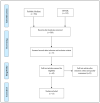Tele-Neuropsychological Assessment of Alzheimer's Disease
- PMID: 34442332
- PMCID: PMC8398333
- DOI: 10.3390/jpm11080688
Tele-Neuropsychological Assessment of Alzheimer's Disease
Abstract
Background: Because of the new pandemic caused by the novel coronavirus disease (COVID-19), the demand for telemedicine and telemonitoring solutions has been exponentially raised. Because of its special advantage to treat patients in an emergency without physical presence at a hospital via video conferencing, telemedicine has been used to overcome distance barriers and to improve access to special domains like neurology. In these pandemic times, telemedicine has been also employed as a support for the diagnosis and treatment of adult-onset dementia disorders including Alzheimer's disease.
Objective: In this study, we carried out a systematic literature analysis to clarify if the neuropsychological tests traditionally employed in face-to-face (FTF) contexts are reliable via telemedicine.
Methods: A systematic literature search for the past 20 years (2001-2020) was carried out through the medical databases PubMed (Medline) and the Cumulative Index to Nursing and Allied Health Literature (CINAHL). The quality assessment was conducted by adopting the Newcastle Ottawa Scale (NOS) and only studies with a NOS ≥ 7 were included in this review.
Results: The Mini-Mental State Examination (MMSE) results do not differ when tests are administered in the traditional FTF modality or by videoconference, and only negligible minor changes in the scoring system were noticeable. Other neuropsychological tests used to support the diagnosis of AD and dementia such as the Token Test, the Comprehension of Words and Phrases (ACWP), the Controlled Oral Word Association Test showed high reliability between the two modalities considered. No differences in the reliability concerning the living setting or education of the subjects were reported.
Conclusions: The MMSE, which is the main screening test for dementia, can be administered via telemedicine with minor adaptation in the scoring system. Telemedicine use for other neuropsychological tests also resulted in general reliability and enough accuracy. Cognitive assessment by videoconference is accepted and appreciated and therefore can be used for dementia diagnosis in case of difficulties to performing FTF assessments. This approach can be useful given a personalized medicine approach for the treatment of adult-onset dementia disorders.
Keywords: AD; dementia; neuropsychological tests; telemedicine; videoconferencing.
Conflict of interest statement
The authors declare no conflict of interest.
Figures
References
-
- Hanach N., de Vries N., Radwan H., Bissani N. The effectiveness of telemedicine interventions, delivered exclusively during the postnatal period, on postpartum depression in mothers without history or existing mental disorders: A systematic review and meta-analysis. Midwifery. 2021;94:102906. doi: 10.1016/j.midw.2020.102906. - DOI - PubMed
-
- Battineni G., Chintalapudi N., Amenta F. Machine learning in medicine: Performance calculation of dementia prediction by support vector machines (SVM) Inform. Med. Unlocked. 2019 doi: 10.1016/j.imu.2019.100200. - DOI
Publication types
LinkOut - more resources
Full Text Sources
Miscellaneous


